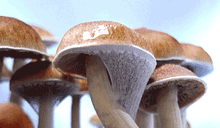Magic Mushrooms and LSD not linked with mental health problems
Geplaatst onder: Psychedelica: Wetenschap en Onderzoek

To jump to the conclusion of the research: "We did not find use of psychedelics to be an independent risk factor for mental health problems." Not saying it is healthy or promote the use of lsd or magic mushrooms the researchers de-mythified some general assumption of psychedelic drugs use.
The article in the news section of the Norwegian University of Science and Technology (https://www.ntnu.edu/news/2013-news/lsd-survey)
LSD and other psychedelics not linked with mental health problems
(19.08.2013) The use of LSD, magic mushrooms, or peyote does not increase a person's risk of developing mental health problems, according to an analysis of information from more than 130,000 randomly chosen people, including 22,000 people who had used psychedelics at least once.
Researcher Teri Krebs and clinical psychologist Pål-Ørjan Johansen, from the Norwegian University of Science and Technology's (NTNU) Department of Neuroscience, used data from a US national health survey to see what association there was, if any, between psychedelic drug use and mental health problems.
The authors found no link between the use of psychedelic drugs and a range of mental health problems. Instead they found some significant associations between the use of psychedelic drugs and fewer mental health problems.
The results are published in the journal PLOS One and are freely available online.
Symptoms and mental health treatment considered
The researchers relied on data from the 2001-2004 National Survey on Drug Use and Health, in which participants were asked about mental health treatment and symptoms of a variety of mental health conditions over the past year. The specific symptoms examined were general psychological distress, anxiety disorders, mood disorders, and psychosis.
Armed with this information, Krebs and Johansen were able to examine if there were any associations between psychedelic use and general or specific mental health problems. They found none.
"After adjusting for other risk factors, lifetime use of LSD, psilocybin, mescaline or peyote, or past year use of LSD was not associated with a higher rate of mental health problems or receiving mental health treatment," says Johansen.
Could psychedelics be healthy for you?
The researchers found that lifetime use of psilocybin or mescaline and past year use of LSD were associated with lower rates of serious psychological distress. Lifetime use of LSD was also significantly associated with a lower rate of outpatient mental health treatment and psychiatric medicine prescription.
The design of the study makes it impossible to determine exactly why the researchers found what they found.
"We cannot exclude the possibility that use of psychedelics might have a negative effect on mental health for some individuals or groups, perhaps counterbalanced at a population level by a positive effect on mental health in others," they wrote.
Nevertheless, "recent clinical trials have also failed to find any evidence of any lasting harmful effects of psychedelics," the researchers said, which supports the robustness of the PLOS One findings.
In fact, says Krebs, "many people report deeply meaningful experiences and lasting beneficial effects from using psychedelics."
"Other studies have found no evidence of health or social problems among people who had used psychedelics hundreds of times in legally-protected religious ceremonies," adds Johansen.
What's the bottom line on psychedelic use?
Psychedelics are different than most other recreational drugs. Experts agree that psychedelics do not cause addiction or compulsive use, and they are not known to harm the brain.
When evaluating psychedelics, as with any activity, it is important to take an objective view of all the evidence and avoid being biased by anecdotal stories either of harm or benefit, the researchers say.
"Everything has some potential for negative effects, but psychedelic use is overall considered to pose a very low risk to the individual and to society," Johansen says, "Psychedelics can elicit temporary feelings of anxiety and confusion, but accidents leading to serious injury are extremely rare."
"Early speculation that psychedelics might lead to mental health problems was based on a small number of case reports and did not take into account either the widespread use of psychedelics or the not infrequent rate of mental health problems in the general population," Krebs explains.
"Over the past 50 years tens of millions of people have used psychedelics and there just is not much evidence of long-term problems," she concludes.
Teri S. Krebs, Pål-Ørjan Johansen. Psychedelics and Mental Health: A Population Study. PLoS ONE, 2013; 8 (8): e63972 DOI: 10.1371/journal.pone.0063972
News on Science Daily https://www.sciencedaily.com/releases/2013/08/130819185302.htm


Augustus 21, 2013